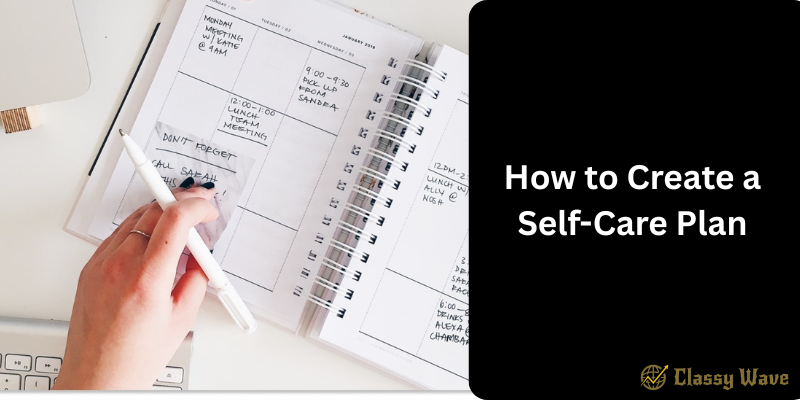How to Create a Self-Care Plan | Classy Wave
In today’s fast-paced world, taking care of yourself isn’t a luxury — it’s a necessity. A self-care plan helps you manage stress, maintain balance, and nurture your mental, physical, and emotional health. It’s your personal roadmap to feeling better, living healthier, and staying motivated.
If you’ve ever felt burned out, overwhelmed, or emotionally drained, creating a self-care plan can help you regain control and recharge your energy.
What Is a Self-Care Plan?
A self-care plan is a structured approach to taking care of your overall well-being. It involves identifying your needs and creating routines that support your body, mind, and soul. It’s not about being selfish — it’s about ensuring you have the energy and stability to handle life’s challenges.
Why You Need a Self-Care Plan
Without intentional self-care, stress and exhaustion can easily take over. Having a personalized plan helps you:
- Prevent burnout and fatigue
- Improve focus and productivity
- Strengthen mental health
- Build emotional resilience
- Maintain a healthy work-life balance
Think of it as your personal survival guide for modern life.
Step 1: Assess Your Current Habits
Start by taking an honest look at your current lifestyle. Ask yourself:
- How do I spend my free time?
- Am I getting enough rest?
- Do I take care of my body through exercise and healthy eating?
- How do I cope with stress or negative emotions?
Understanding your current habits helps identify what’s missing or what needs improvement.
Step 2: Identify Your Needs
Self-care looks different for everyone. Some people need more rest, others need social interaction, creativity, or solitude. Break down your needs into key categories:
- Physical self-care: Sleep, nutrition, exercise, and relaxation
- Emotional self-care: Setting boundaries, journaling, or seeking therapy
- Social self-care: Spending time with loved ones or joining supportive communities
- Mental self-care: Reading, learning, or meditating
- Spiritual self-care: Prayer, mindfulness, or connecting with nature
Step 3: Set Realistic Goals
When building a self-care plan, avoid trying to change everything overnight. Set small, achievable goals like:
- “I’ll take a 15-minute walk every day.”
- “I’ll spend 10 minutes journaling before bed.”
- “I’ll disconnect from my phone one hour before sleep.”
Start small — consistency matters more than perfection.
Step 4: Create a Routine That Fits Your Lifestyle
Consistency turns self-care into a habit. Build a schedule that works for you:
- Morning routine: Stretching, meditation, healthy breakfast
- Daytime habits: Stay hydrated, take breaks, breathe deeply
- Evening rituals: Gratitude journaling, reading, self-reflection
Make sure your plan feels natural — not forced. The goal is to make self-care a part of your daily life, not a chore.
Step 5: Set Boundaries
Boundaries protect your peace. Learn to say “no” when needed. Whether it’s declining extra work, avoiding toxic people, or reducing screen time, boundaries ensure your energy is spent wisely.
Remember, you can’t pour from an empty cup — protecting your time and emotional energy is essential self-care.
Step 6: Include Activities You Enjoy
Your self-care plan should bring joy, not feel like another task. Include activities that make you feel alive — painting, gardening, listening to music, cooking, or dancing.
Joyful activities release stress and trigger positive emotions that improve your overall well-being.
Step 7: Track Your Progress
Keep a simple self-care journal or planner to note your mood, habits, and energy levels. Tracking helps you stay consistent and shows what’s working (and what’s not).
For example, if you notice you feel calmer on days you meditate, make that a regular habit.
Step 8: Adjust as You Grow
Self-care isn’t static — it evolves as you do. Your needs may change with time, stress levels, or personal goals. Review your self-care plan every few months and adjust it based on what’s currently important to you.
Self-Care Ideas to Try Today
Here are a few quick ideas to get started:
- Take a long, relaxing bath
- Write down three things you’re grateful for
- Go for a short nature walk
- Listen to your favorite playlist
- Unplug from social media for an hour
- Try deep breathing or a guided meditation
Even 10 minutes of intentional self-care can make a big difference.
Common Mistakes to Avoid
When creating your plan, avoid these common pitfalls:
- Trying to do too much too soon
- Ignoring emotional or spiritual needs
- Comparing your routine to others
- Feeling guilty for taking time for yourself
Remember: self-care isn’t about perfection — it’s about progress and self-compassion.
Benefits of Following a Self-Care Plan
Once you stick to your self-care plan, you’ll notice improvements such as:
- Better sleep and energy levels
- Improved emotional balance
- Clearer focus and motivation
- Lower stress and anxiety
- Increased happiness and self-awareness
It’s like pressing a reset button for your mind and body.
Conclusion
Creating a self-care plan isn’t complicated — it’s about listening to yourself and committing to small, meaningful actions every day. Start simple, stay consistent, and watch how your mood, health, and outlook transform.







